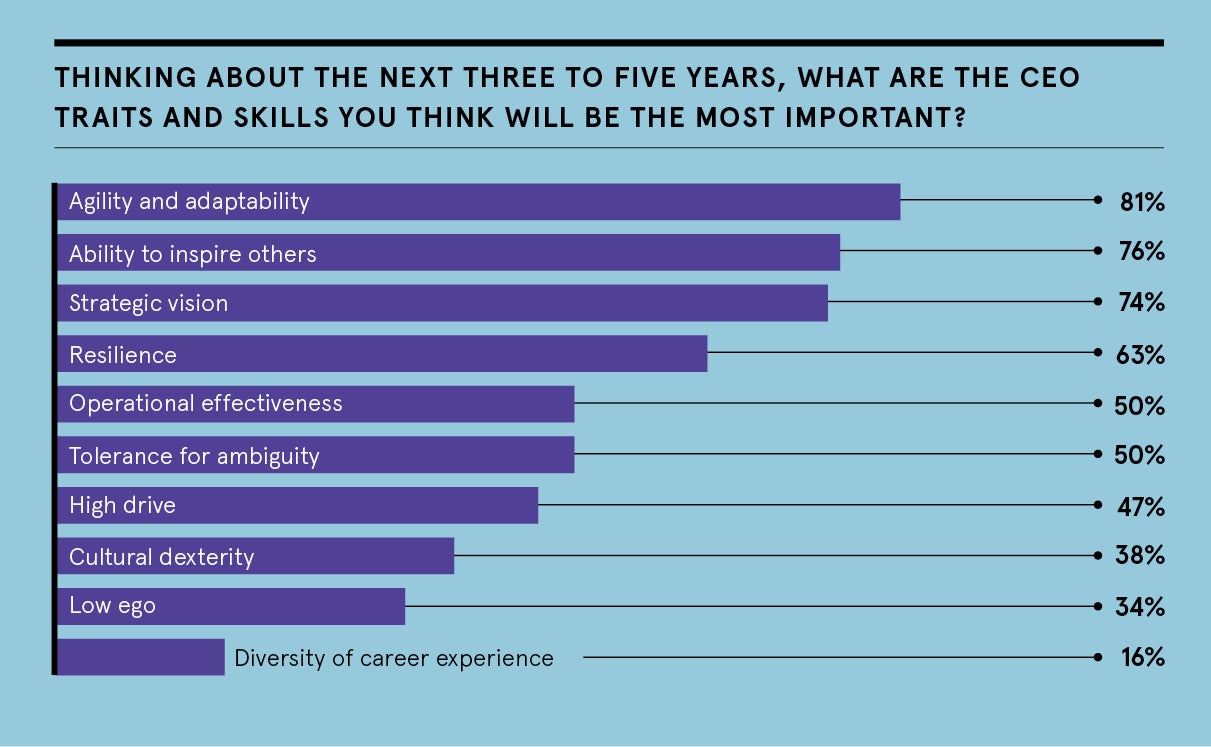Three decades on from when the acronym VUCA was first coined by the US military to describe the more volatile, uncertain, complex and ambiguous world left behind at the end of the Cold War, its use is now more regularly applied in a business leadership context.
In recent years, virtually every sector has had to deal with accelerating rates of change, much of it driven by disruptive new technologies, disintermediation, growing competition and the rise of new market players with radically different business models.
The current crisis, spurred by the coronavirus pandemic, has accelerated the rate of change even further, forcing business leaders to deal with unprecedented levels of volatility and uncertainty, and limited reliable data with which to inform their decision-making.
The most effective leadership styles are underpinned by drive, humility and inspiration
As a consequence, chief executives, and the skills and experiences they have gained on the rise to the C-suite, have been tested like never before. Some have risen to the challenge, pivoting strategy while remaining engaged with the operational challenges, inspiring their organisation and continuing to communicate effectively through remote working.
Others, however, have been found wanting. Using another military analogy, one FTSE chairman described his CEO at the height of the crisis as “missing in action”, lacking the skills, experiences and behaviours that distinguish his more successful contemporaries.
So, what is it that ultimately makes the difference? From working with and studying hundreds of CEOs across publicly listed and privately held businesses, Savannah Group has identified three core strands of “leadership DNA” which have emerged as primary indicators of the most successful.
Agility and adaptability
Rapidly changing business environments require strategically agile leaders, able to adapt quickly to changing situations, with a high degree of cultural sensitivity that makes them equally effective across the global span of their business operations. In our survey of 85 chairs and CEOs from FTSE and private equity-backed companies in June 2020, “agility and adaptability” was ranked the most important attribute for future CEOs. Agility is often fuelled by resilience and this is only going to become more important in an increasingly VUCA business environment.
Strategic vision built on breadth of knowledge
The pandemic is an extreme example of an unprecedented challenge. No one has all the answers because it’s never happened before. When there are no precedents for the challenges you face, the best-equipped leaders are those with a diverse set of skills and breadth of knowledge gained through wide and varied experience.
Different companies, sectors, functions and geographies all add to the mix, enhancing a CEO’s ability “to know what to do when you don’t know what to do”. These are leaders who can draw on multiple reference points, develop more effective strategy and execute with greater confidence.
The same applies to their leadership teams. The greater diversity of knowledge and experience surrounding CEOs, the richer the insight they can draw on to deal with unprecedented challenges.
Authenticity and engagement
The most effective leadership styles are underpinned by drive, humility and inspiration. In his book Good To Great, Jim Collins associates these attributes with “level-5 leaders”, capable of uniting organisations behind a clear vision and taking people with them.
In a world of complex organisational structures and joint-venture partnerships that require greater collaboration, leaders whose natural style is to influence and persuade, rather than command and control, are more successful. In our survey, “ability to inspire others” was considered a critical CEO trait by 76 per cent of respondents.
Any CEO succession is contextual, be it external appointment or internal promotion, and other factors will therefore come into play. Nevertheless, it is increasingly clear CEOs with this leadership DNA are significantly more likely to thrive in today’s volatile business environment.
For more information please visit savannah-group.com

